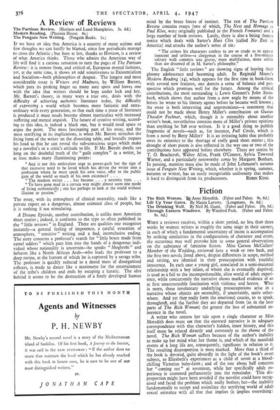A Review of Reviews
IF we have an idea that America is a country of many actions and few thoughts we can hardly be blamed, since few periodicals manage to cross the Atlantic • but here at last, thanks to Horizon, is a review of what America thinks. Those who admire the American way of life will find it a curious sensation to turn the pages of The Partisan Review: it is remote from, and critical of, European mental fashions, yet, at the same time, it shows an odd sensitiveness to Existentialism and Socialism—both philosophies of despair. The longest and most considerable essay is Writers and Madness, by William Barrett, which puts its probing finger on many sore spots and leaves one with the idea that writers should be kept under lock and key. Mr. Barrett's theory, in many ways a true one, deals with the difficulty of achieving authentic literature today, the difficulty of expressing a world which becomes more fantastic and extra- ordinary with every generation, so that each time a piece of literature is produced it must needs become almost inarticulate with increased suffering and mental anguish. The future of creative writing, accord- ing to this idea, is indeed a black one, but it would need space to argue the point. The most fascinating part of his essay, and the most terrifying in its implications, is when Mr. Barrett stretches the living form of the writer on the dissecting table, and brutally trepans his head so that he can reveal the sub-conscious urges,.which make up a novelist's or a critic's attitude to life. If Mr. Barrett dwells too long on the doubtful truth of the "guilt complex" in a writer, he at least makes many illuminating points: "And is not this ambivalent urge to power-guilt but the sign of that excessive need to be loved which has driven the writer into a profession where he must speak his own voice, offer to the public gaze of the world so much of his own existence? . . .
"The modern writer . . . has become . . . a neurotic type. . . .
"To have gone mad in a certain way might almost seem one mode of living authentically ; one has perhaps to look at the world without illusion or passion."
The essay, with its atmosphere of clinical neutrality, reads like a private report on a dangerous, almost criminal class of people, but it is nothing if not stimulating.
A Distant Episode, another contribution, is unlike most American short stories ; indeed, it conforms to the type so often published in the "little reviews" in England. There are qualities one recognises instantly—a general feeling of impotence, a careful evocation of atmosphere, "sensitive" writing and a bad, inconclusive ending. The story concerns a professor's search for "little boxes made from camel udders" which puts him into the hands of a dangerous indi- vidual whose nationality is uncertain—he speaks " Moghrebi " and behaves like a North African Arab—who leads the professor to a deep ravine, at the bottom of which he is captured by a savage tribe. The professor is quickly reduced to a dazed mass of disorganised reflexes, is made to dance like a marionette for the entertainment of the tribe's children and ends by escaping a lunatic. The idea behind it seems to be the destruction of a finely developed human mind by the brute forces of instinct. The rest of The Partisan Review contains essays (two of which, The Nest and Homage to Paul Klee, were originally published in the French Fontaine) and a large number of book reviews. Lastly, there is also a biting theatre notice which deals with Sartre's Huis Clos (called No Exit in America) and attacks the author's sense of sin: "The crimes his characters confess to are so crude as to appear innocent and artless—a clergyman in the course of a five-minute solitary walk commits sins graver, more multifarious, more subtle than are dreamed of in M. Sartre's philosophy."
The English "little reviews" are showing signs of leaving their gloomy adolescence and becoming adult. In Reginald Moore's Modern Reading (lit), which appears for the first time in book-form with several- new features, one detects a sense of balance and per- spective which promises well for the future. Among the critical contributions, the most outstanding is Lewis Gannett's lohn Stein- beck, which shows that author from a new angle by means of the letters he wrote to his literary agents before he became well known ; the essay is both interesting and unpretentious—a statement that could not be made about Henry Miller's contribution on Gustav Theodor Fechner, which, though it is ostensibly about another writer's book, nevertheless contains more of Miller's private opinions than anything he Hat ever written. Is it a good thing to publish fragments of novels—such as, for instance, Full Circle, Which is from a novel by Betty Miller? It is an irritating habit that probably owes its existence to the shortage of really good short stories ; this drought of short pieces is also reflected in the way one or two of the contributions have appeared before elsewhere. There are stories by T. 0. Beachcroft, Valter Allen, Frank O'Cormer, Sylvia Towsend Warner, and a particularly noteworthy conte by Margaret Bonham. In passing, mention must also be made of John Lehmann's autumn issue of Penguin New Writing, which, whether it is spring, summer, autumn or winter, has an easily recognisable uniformity that makes it hard to distinguish from its predecessors. ROBIN KING.


































 Previous page
Previous page